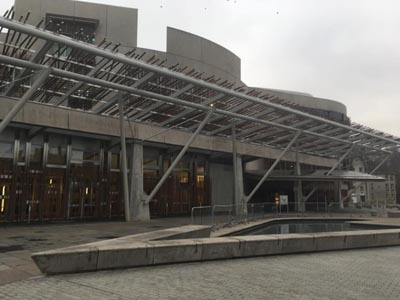New legislation will protect people, public services and the economy.
The Scottish Parliament has unanimously supported new emergency powers to help protect the public, maintain essential public services and support the economy during the coronavirus (COVID-19) outbreak.
The Coronavirus (Scotland) Bill adjusts the law on evictions to protect people renting their homes in the private and social sector. The Bill delivers new provisions that are designed to ensure businesses, consumers and public services continue to operate effectively and makes necessary adjustments to the criminal justice system to ensure essential services continue.
People and some small businesses that are unable to repay debts due to the outbreak will be able to apply for a six-month ‘breathing space’ period. This will allow them to seek money advice and find long-term solutions to repay debts.
The Bill also allows licensing authorities to extend the deadlines for licence applications that allow the sale and supply of alcohol, and taxi and private hire. This flexibility will help to minimise the risk of losing current licensing rights due during the outbreak.
Constitution Secretary Michael Russell said:
“Scotland is facing an unprecedented situation. This emergency Bill delivers necessary powers that will allow us to prioritise tackling the coronavirus pandemic.
“People across the country have responded magnificently as we work together to save lives. It is in that spirit of co-operation and consensus that we have worked across Parliament to pass these vital – time-limited – measures,
“By unanimously passing this Bill the Parliament has ensured practical help will be given to many businesses and to people struggling financially because of the crisis.
“The Scottish Government will continue to engage across parties to help the country get through this most testing of times. In particular we must have a criminal justice system that can operate effectively while treating all those involved, including victims, fairly.”
Background
The Coronavirus (Scotland) Bill
The majority of the emergency measures in the Bill will expire automatically six months after they come into force. The Scottish Parliament may extend the measures for two further periods of six months, giving the measures in the Bill a maximum duration of 18 months.
The Scottish Government will provide a report to Parliament every two months about the use of these emergency powers.
The Coronavirus (Scotland) Bill extends the current six-week period that provides people and some businesses with breathing space to seek money advice and find longer term solutions to repay debts to six months. It also removes the limitation that means they can only apply for such a breathing space once in a 12 month period. [These measures apply to individuals, partnerships, corporate and unincorporated bodies and trusts, though not to companies or LLPs.]
With both businesses and licensing authorities under unprecedented disruption as a result of the coronavirus outbreak it is likely people could lose their licences through no fault of their own. The new legislation allows for licensing authorities to extend timescales and deadlines. It also gives discretion to allow licensing hearings to be conducted by telephone, video-conferencing or by written communication, including email.
The COVID-19 outbreak affects the ability of both planning authorities and applicants to deal with planning permissions that are due to expire. When planning permission is granted applicants have a period of three years to commence development before the permission lapses. The new legislation extends any planning permission that would lapse within the next six months so that it will not expire until April 2021.





